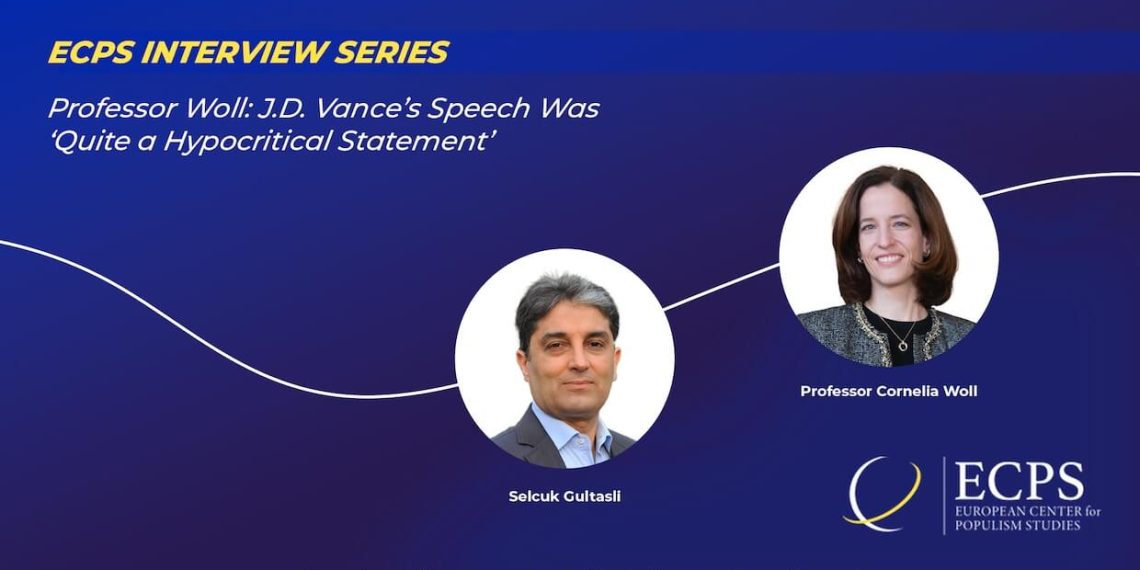In an exclusive interview with ECPS, Professor Cornelia Woll, President of the Hertie School, criticized US Vice President J.D. Vance’s speech at the Munich Security Conference, calling it “quite a hypocritical statement.” She pointed out that while Vance accused Europe of restricting free speech, the Trump administration actively attacks institutions like Wikipedia and NPR. Professor Woll also warned that the US, under Trump, is pursuing policies that align with Russia’s interests, deepening transatlantic fractures. With nationalist rhetoric rising on both sides of the Atlantic, she emphasized that Europe must navigate these challenges to maintain economic stability and security.
Interview by Selcuk Gultasli
In a striking critique of US Vice President J.D. Vance, Professor Cornelia Woll, President of the Hertie School in Berlin and a leading expert on international political economy, described his speech at the Munich Security Conference as “quite a hypocritical statement.” Speaking with the European Center for Populism Studies (ECPS) on Thursday, Professor Woll dissected the contradictions in Vance’s rhetoric, particularly his claims that Europe’s speech restrictions pose a greater threat than military aggression from Russia or China.
“I don’t know if one should even react,” Professor Woll said of Vance’s remarks, pointing out the glaring irony of his accusations. “Everyone in the room—and I was in the room when he gave that speech—was well aware of the hypocrisy.” She noted that Vance’s critique of European policies comes at a time when the Trump administration itself is actively attacking free expression within the US. “This comes at a time when the Trump administration is firing the head of an art institution, the Kennedy Center, attacking Wikipedia, and targeting public radio and NPR,” she explained. “It is a common strategy for the Trump administration to accuse others of doing precisely what they themselves are doing.”
Beyond hypocrisy, Professor Woll argued that Vance’s speech was little more than a domestic campaign statement. “It was a national campaign speech, like many heard during an election,” she said, adding that its delivery at a major security conference reflected “the weakness of J.D. Vance in international discussions.” She suggested that Trump’s broader geopolitical calculations—including talks with Russia and Saudi Arabia—likely influenced Vance’s remarks, forcing him to focus on internal US politics rather than engage in substantive global security discussions.
Professor Woll also raised concerns about the broader implications of US policy under Trump and Vance, particularly regarding Germany. “Let me put it very bluntly: what Elon Musk, J.D. Vance, and Donald Trump are currently doing is supporting Russia’s interests,” she warned. She emphasized that many Germans still see these actions as fundamentally against their country’s security and long-term development, not just because of their history but also due to the risks posed by increasing Russian influence.
This growing divide is not just about rhetoric; it has real consequences for transatlantic relations. Professor Woll pointed out that Europe can no longer count on the US as a reliable partner. “Even though the US is not fully disengaging or explicitly leaving NATO, the uncertainty about whether it can be relied upon is significant,” she said. “Today, who can say with certainty that if Russia attacked a NATO partner, like Finland, the US would intervene. We simply do not know, and that uncertainty is deeply consequential.”
These shifts in US policy are also contributing to a broader geopolitical transformation. Professor Woll noted that a post-Western economic order is already emerging, driven in part by China’s strategic investments and growing sphere of influence. “We already see a stable and strong Chinese sphere of influence, which is now challenging the structure of multilateral institutions established under the Bretton Woods system,” she explained. This raises the question of Europe’s role—whether it will align fully with US interests or attempt to position itself as a third force between China and the US. “In my opinion, the latter would be the better path forward,” Professor Woll concluded.
At the same time, Europe faces internal struggles that could weaken its global standing. The rise of far-right parties like the Alternative for Germany (AfD) has been fueled by economic grievances and anti-globalization sentiments. Professor Woll warned that if the far right gains further power, Europe could see increased protectionism and economic fragmentation. “Every far-right party includes economic protectionism on their agenda, across all domains—whether it is student mobility, economic exchange, or military investment,” she noted.
With nationalist rhetoric gaining traction on both sides of the Atlantic and traditional alliances under strain, Professor Woll’s analysis underscores the fragility of the liberal world order. As the US embraces economic nationalism and European politics become more polarized, the future of global governance remains uncertain. The challenge now is whether European leaders can navigate these fractures while maintaining economic stability and security.


